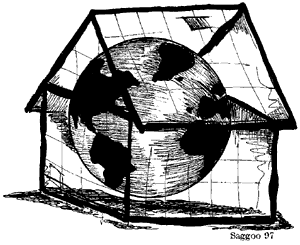![]()
![[ OPINIONS ]](/images/fall97/opinionsf97.gif)
![]()
By Brad Senning
Arizona Daily Wildcat November 3, 1997
Surfing the Global Warming Swell
![[Picture]](04_3_i.gif)
Brad Senning |
Arizona homeowners always figured their land would be beach-front property
someday. You can see the old men sitting on their front porches, sweaty
glasses of lemonade in their hands. Their black socks are pulled full-tilt
up to their mid-calves, and black, wrap-around sunglasses engulf the melting
flesh of their faces. But they're undaunted. There's a hidden nod of understanding
in this gesture of vacant complacency.
They read the news. They know California is about to sink into the ocean, not necessarily as a result of earthquakes, and they've already waxed their surfboards.
The oceans have risen 4 to 10 inches in this century as a result of a one-degree rise in world temperature. In Florida, they're expecting up to 37 inches of new ocean by 2100, that is, if the world keeps up its production of greenhouse gases.
You've all heard of the "greenhouse effect." You know it's a bad thing. You might even know that the reason you've got to take those dad-blasted vehicle emissions tests is because the government is trying to reduce this "effect." But do you know how it happens, or why it's so important? Why, indeed, should we care?
Anytime we burn fossil fuels (coal, oil and natural gas) to produce energy, bad gases (carbon dioxide, nitrogen oxide, etc.) are released as a by-product into the atmosphere. These bad gases, which have been dubbed "greenhouse gases," hold on to infrared radiation from the sun and turn it into heat. The increased heat caused by our pollution has been melting glaciers. The heat has also caused the ocean to expand in the way a Ball-Park wiener expands in a microwave. And just as if we were living in a prolific greenhouse, tropical diseases are also flourishing.
Humans have infested the air with a 29 percent increase of carbon dioxide poisoning since the beginning of the Industrial Revolution. By the end of the next century, at the rate we are currently producing, we will double the amount of carbon dioxide particulate in the atmosphere.
Faced with two upcoming environmental summits, the first in Germany, the second two months away in Kyoto, Japan, President Clinton is mustering an environmental position. He recently threatened to install regulations to reduce the production of heat-trapping air pollution to 1990 levels (considered, by politicians, to be the benchmark year) by the year 2012.
Coal companies are fighting more regulations because, they say, no definitive study has been completed about greenhouse gases. It's the old tobacco company defense: no studies have proved nicotine causes cancer, just as no study actually proves a causal relationship between carbon dioxide in the atmosphere and the warming environment, just as no study actually proves industry officials might suffer mental anguish when they see my extended middle finger.
President Bill Clinton, who usually sits on his hands when it comes to signing bills or treaties which might affect economic growth, seems intent on doing something about this environmental problem. "Although we don't know everything," he said, sympathizing with corporate doubters, "what we do know is more than enough to warrant action."

Industry is planning a $15 million ad campaign to persuade Americans the global warming trend is an illusion projected by feverish scientists, and Clinton's efforts to reduce pollution in the atmosphere will cost Americans more money. American Electric Power, a company operating 18 coal plants across the nation, warns that electricity prices will increase as much as 7 percent if new regulations are imposed.
Will the future inhabitants of Florida, when the ocean tide eventually navigates through their living-rooms, be able to sue the energy industry for negligence? Let's hope it doesn't have to come to that.
The job of government is not just to serve the public, but to lead the public. Clinton has concentrated his office's efforts on improving the economy because a booming economy is usually accompanied by a whole lot of smiling voters. Unfortunately, a happy economy also means a sad environment. The only dip in our country's production of greenhouse gases since 1990 was in 1992, when the country was in a recession.
Last year, President Clinton asked for a "voluntary effort" from industry and citizens to help reduce the production of greenhouse gases. This year our country's production of deleterious gases increased by 3.4 percent.
At the heart of our global warming problem is the fact that the people of this country use a lot of electricity, and electricity is often run by using fossil fuels. The Sierra Club, a group of conservationists founded by John Muir, recently admitted the impossibility of getting an entire nation to reduce its consumption. Artificial methods such as government regulations have to be implemented.
If you hear Grandma and Grandpa start talking about gnarly waves and catching a tube, you'd better start petitioning your congressman for more environmental regulation. Your grandparents are only going to live long enough to ride a few waves and bail the way of mortal flesh. We have to live with their pollution, and the pollution of all previous ages. That's a lot of cleaning up to do. If we don't do the cleaning, the ocean will. And its deluge certainly won't spare us this time.
Brad Senning is a senior majoring in American literature and creative writing.



